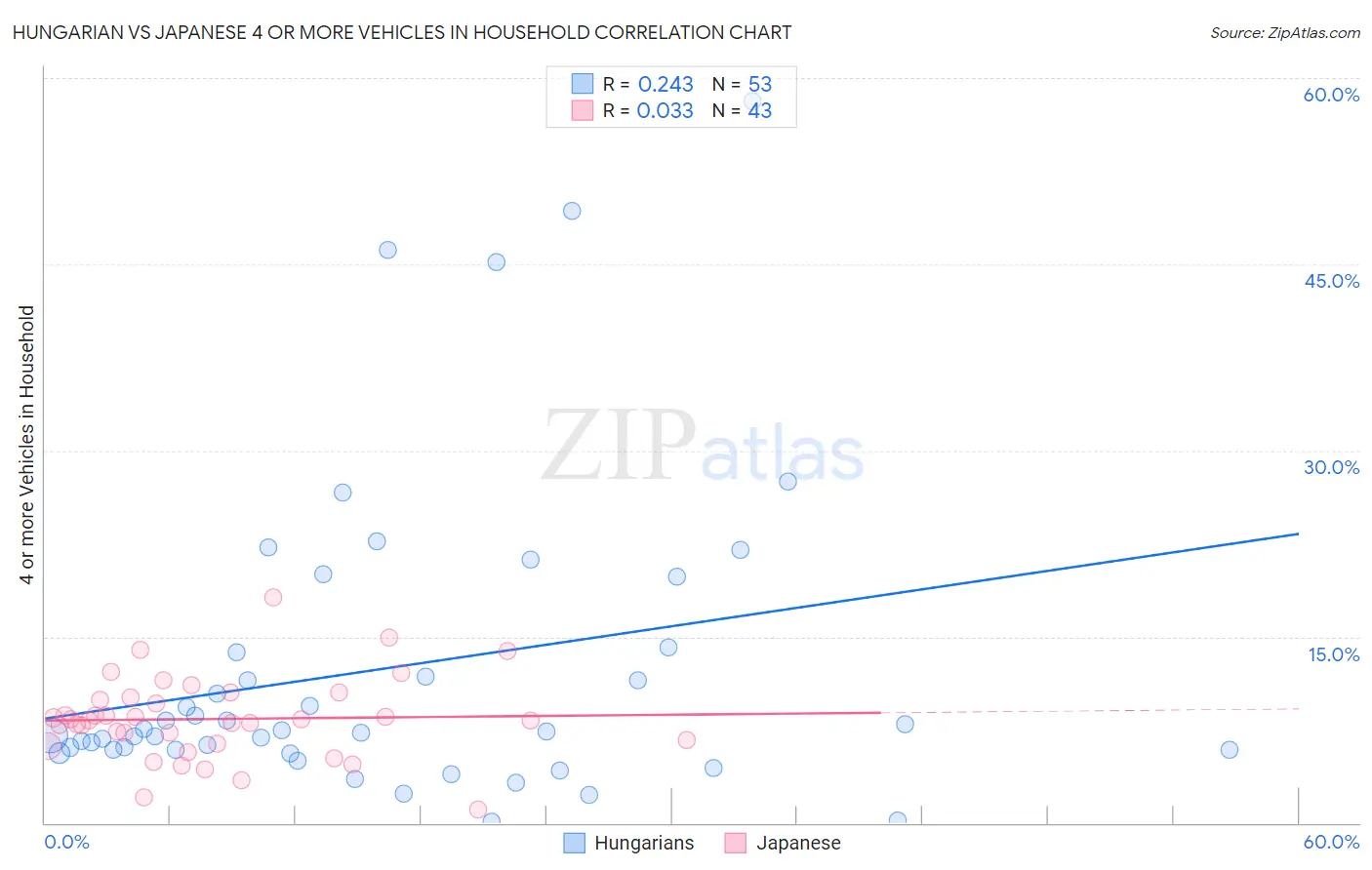Hungarian vs Japanese 4 or more Vehicles in Household
COMPARE
Hungarian
Japanese
4 or more Vehicles in Household
4 or more Vehicles in Household Comparison
Hungarians
Japanese
6.4%
4 OR MORE VEHICLES IN HOUSEHOLD
61.1/ 100
METRIC RATING
164th/ 347
METRIC RANK
7.7%
4 OR MORE VEHICLES IN HOUSEHOLD
100.0/ 100
METRIC RATING
52nd/ 347
METRIC RANK
Hungarian vs Japanese 4 or more Vehicles in Household Correlation Chart
The statistical analysis conducted on geographies consisting of 483,846,610 people shows a weak positive correlation between the proportion of Hungarians and percentage of households with 4 or more vehicles available in the United States with a correlation coefficient (R) of 0.243 and weighted average of 6.4%. Similarly, the statistical analysis conducted on geographies consisting of 248,680,016 people shows no correlation between the proportion of Japanese and percentage of households with 4 or more vehicles available in the United States with a correlation coefficient (R) of 0.033 and weighted average of 7.7%, a difference of 20.2%.

4 or more Vehicles in Household Correlation Summary
| Measurement | Hungarian | Japanese |
| Minimum | 0.062% | 1.1% |
| Maximum | 58.1% | 18.1% |
| Range | 58.1% | 17.0% |
| Mean | 12.4% | 8.4% |
| Median | 7.3% | 8.3% |
| Interquartile 25% (IQ1) | 5.9% | 6.3% |
| Interquartile 75% (IQ3) | 13.9% | 10.1% |
| Interquartile Range (IQR) | 8.0% | 3.8% |
| Standard Deviation (Sample) | 12.6% | 3.3% |
| Standard Deviation (Population) | 12.5% | 3.3% |
Similar Demographics by 4 or more Vehicles in Household
Demographics Similar to Hungarians by 4 or more Vehicles in Household
In terms of 4 or more vehicles in household, the demographic groups most similar to Hungarians are Chilean (6.4%, a difference of 0.010%), Immigrants from Peru (6.4%, a difference of 0.14%), Immigrants from Pakistan (6.4%, a difference of 0.22%), Immigrants from Cameroon (6.4%, a difference of 0.35%), and Immigrants from Denmark (6.4%, a difference of 0.35%).
| Demographics | Rating | Rank | 4 or more Vehicles in Household |
| Peruvians | 69.4 /100 | #157 | Good 6.5% |
| Zimbabweans | 67.1 /100 | #158 | Good 6.4% |
| Indians (Asian) | 66.3 /100 | #159 | Good 6.4% |
| Palestinians | 65.8 /100 | #160 | Good 6.4% |
| Immigrants | Cameroon | 64.4 /100 | #161 | Good 6.4% |
| Immigrants | Pakistan | 63.2 /100 | #162 | Good 6.4% |
| Chileans | 61.2 /100 | #163 | Good 6.4% |
| Hungarians | 61.1 /100 | #164 | Good 6.4% |
| Immigrants | Peru | 59.8 /100 | #165 | Average 6.4% |
| Immigrants | Denmark | 57.8 /100 | #166 | Average 6.4% |
| Poles | 56.9 /100 | #167 | Average 6.4% |
| Lebanese | 55.8 /100 | #168 | Average 6.4% |
| Estonians | 55.1 /100 | #169 | Average 6.4% |
| Immigrants | Syria | 52.8 /100 | #170 | Average 6.3% |
| Immigrants | India | 51.9 /100 | #171 | Average 6.3% |
Demographics Similar to Japanese by 4 or more Vehicles in Household
In terms of 4 or more vehicles in household, the demographic groups most similar to Japanese are Immigrants from Laos (7.7%, a difference of 0.12%), Malaysian (7.7%, a difference of 0.38%), Dutch (7.7%, a difference of 0.46%), Immigrants from El Salvador (7.7%, a difference of 0.47%), and Cherokee (7.7%, a difference of 0.63%).
| Demographics | Rating | Rank | 4 or more Vehicles in Household |
| Choctaw | 100.0 /100 | #45 | Exceptional 7.8% |
| Crow | 100.0 /100 | #46 | Exceptional 7.8% |
| Osage | 100.0 /100 | #47 | Exceptional 7.8% |
| Swiss | 100.0 /100 | #48 | Exceptional 7.8% |
| Cherokee | 100.0 /100 | #49 | Exceptional 7.7% |
| Immigrants | El Salvador | 100.0 /100 | #50 | Exceptional 7.7% |
| Immigrants | Laos | 100.0 /100 | #51 | Exceptional 7.7% |
| Japanese | 100.0 /100 | #52 | Exceptional 7.7% |
| Malaysians | 100.0 /100 | #53 | Exceptional 7.7% |
| Dutch | 100.0 /100 | #54 | Exceptional 7.7% |
| Immigrants | Oceania | 100.0 /100 | #55 | Exceptional 7.6% |
| English | 100.0 /100 | #56 | Exceptional 7.6% |
| Pennsylvania Germans | 100.0 /100 | #57 | Exceptional 7.6% |
| Swedes | 100.0 /100 | #58 | Exceptional 7.6% |
| Hispanics or Latinos | 100.0 /100 | #59 | Exceptional 7.6% |